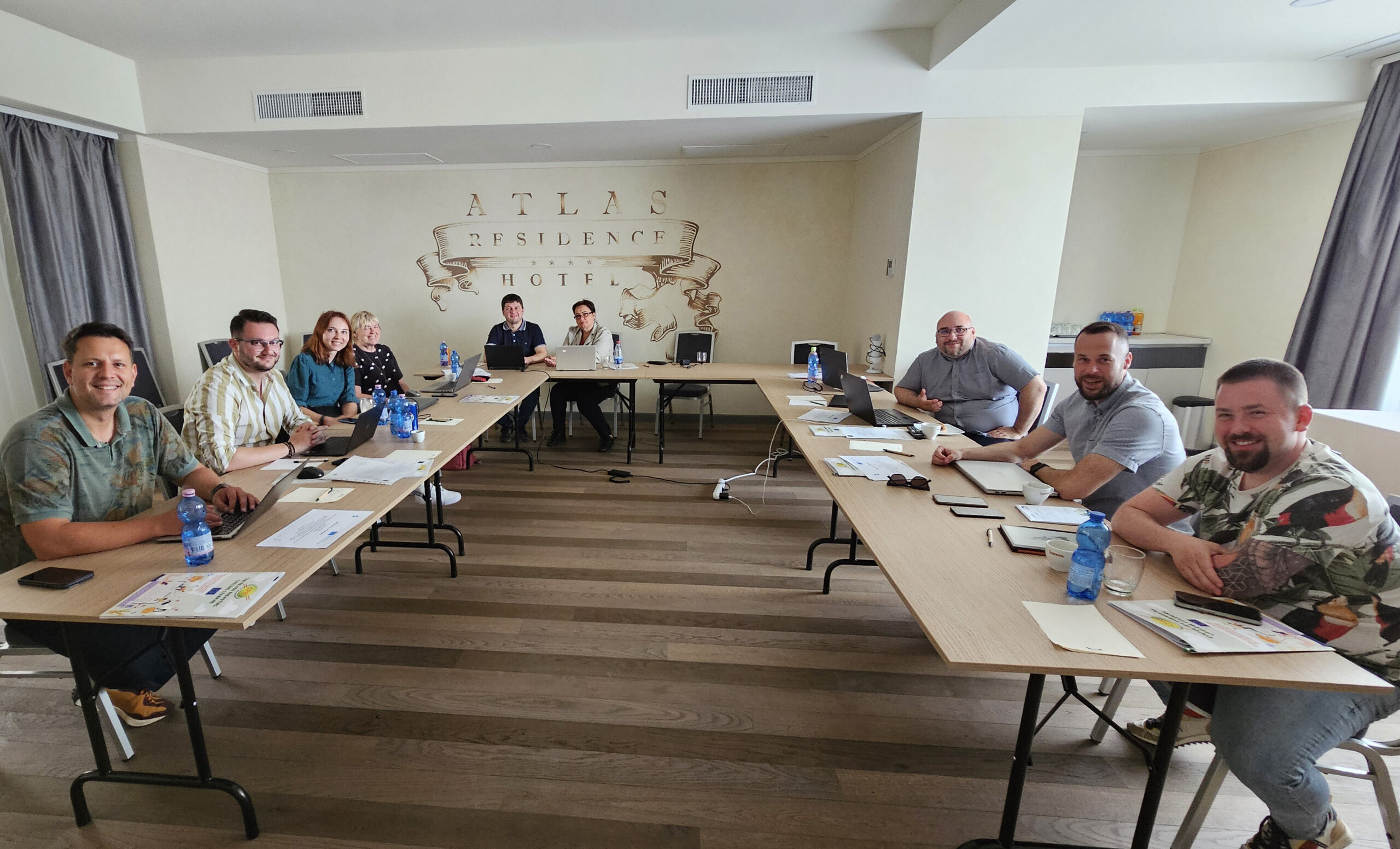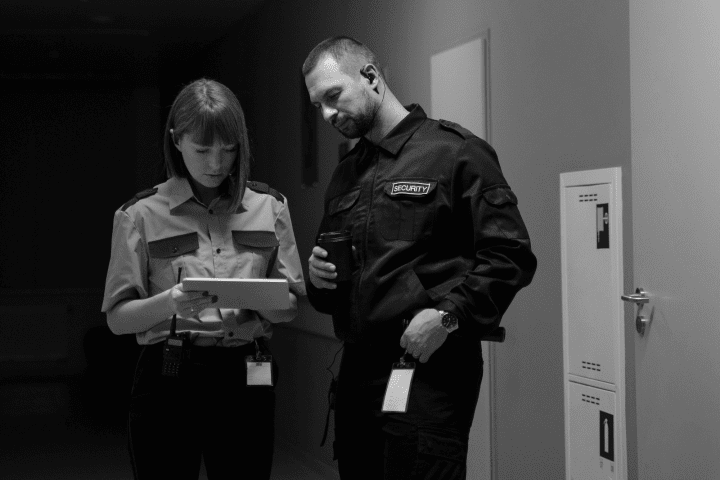Welcome to POLICE-COM
Your gateway to innovative police training and communication excellence.
Welcome to Police-COM 👮
Communication for safer communities
In a world where police officers are often the first point of contact during life’s most critical moments, communication isn’t just a skill, it’s a lifeline. Police-COM is an initiative designed to change how police educators and officers across Europe are trained in communication.Backed by the Erasmus+ Programme and powered by an international consortium from the Czech Republic, Romania, and Lithuania, the project brings together the worlds of education, gamification and respectful communication.
At its core, Police-COM is about training the trainers – providing educators in police academies with the tools, modules, and interactive resources they need to teach communication more effectively. From conflict de-escalation and empathetic listening to intercultural awareness and internal team dialogue, the platform delivers these topics through an engaging and modern interface.
Our unique training portal offers a blend of microlearning, real-life case simulations, learning cards, and short-form videos. These resources are relevant and accessible with the focus to the practical aspect. With input from experienced communication trainers, soft-skill experts, and even a national police union, the project ensures that both the content and the method resonate with real-world needs.
Police-COM is more than a project, it’s a shift in mindset. It challenges outdated models of police education and brings forward a fresh, human-centered approach to training. Whether you’re an academy lecturer, a public safety trainer or part of a rescue service team, Police-COM gives you the tools to prepare officers who serve with clarity, calm, and compassion.
What can you learn here?
- Active listening: Master the art of attentive listening to build trust and improve team dynamics.
Respectful and non-discriminatory communication: Learn to communicate with empathy and inclusivity, fostering positive interactions.
Communication in high-pressure situations: Develop strategies to maintain clarity and composure during emergencies. - Conflict de-escalation and resolution: Acquire techniques to defuse tensions and resolve disputes peacefully. Negotiation and Persuasion Techniques: Enhance your ability to influence and negotiate effectively in various scenarios.
- Emotional intelligence in communication: Build emotional awareness to better connect with colleagues and the community.
ABOUT US
Welcome to the POLICE COM project, a groundbreaking initiative designed to empower educators in police schools and academies. Our mission is to equip teachers with the tools they need to seamlessly and effectively integrate communication training into the development plans of future police officers, as well as the ongoing professional growth of law enforcement personnel and other emergency and security forces.
Through this project, we are developing an international online platform, tailored for local adaptations, that will offer comprehensive modules on the most relevant communication topics. These modules will be organized into detailed, easy-to-use sub-units, allowing educators to effortlessly incorporate them into existing curricula or develop them into standalone courses.
POLICE COM is developed within the Erasmus+ program under the Cooperation Partnership, reflecting our commitment to advancing education across borders. Our consortium includes six partners – comprising universities, NGOs, SMEs, and a police trade union – from three EU countries: the Czech Republic, Lithuania, and Romania. Together, we are pioneering a new standard in communication training for law enforcement.

CURRENT EVENTS

Project implementation date
All the planned project results will be availabe by the end of November 2025 the latest. We will keep you updated if there is more to explore in POLICE-COM.

Trainings of trainers
Once our training materials are finalized, we will organize a specialized training session to introduce the resources, the training platform, and the innovative methods to educators and trainers in law enforcement institutions. If you’re interested in participating, please send us a message. We’ll add you to our list and ensure you receive timely updates and invitation as the training date approaches.

Training portal pilot testing
Your gateway to all POLICE-COM training modules, activities, and support—free for every trainer who wants to make a difference.
Log in, explore, and bring real change to your training sessions.
NEWS FROM THE BLOGS
Module 6: Emotional Intelligence in Communication
In public safety and helping professions, effective communication relies on understanding both ourselves and those we serve. This module supports police, firefighters, medical staff, and front-line responders in developing emotional intelligence (EI) as a vital tool...
Module 4. Conflict de-escalation and resolution.
We have professions that are called upon when things are going well in our life. Not the law enforcement. Professionals are called when something is wrong, when people are in distress, or when there is a conflict. This Module is designed to help you, our dear first...
Module 2: Respectful and non-discriminatory communication
We really care about equality in human society and respect as a key value. Our module Respectful and non-discriminatory communication helps policemen and other professionals in public safety to apply an even more gentle approach into professional work. This module...
CPIP team on POL-COM
In late October 2024, the CPIP team (Romania) participated in a best practices exchange event hosted in Stuttgart, Germany, by Prison Fellowship Germany/Seehaus, following an invitation from the Prison Fellowship Romania Foundation. This experience provided valuable...
POL-COM data in international arena
On 28th of May 2025 MRU team gave a presentation Law Enforcement Students On Learning Emotional Intelligence Techniques Via Ict Based Course. Some Of The Findings Of POL-COM project. Conference agenda
🌍🚨 Exciting news from SustainSecure 2025 in Vilnius!
Our colleague recently took the stage as a speaker at this prestigious international conference focused on sustainability and security innovation. It was a fantastic opportunity to showcase the POLCOM project, highlighting how our gamified training platform is...
🚨 POLCOM Project Partners Meeting April 2025, Vilnius, Lithuania 🚨
Representatives from the consortium partners convened in Romania last week for a pivotal project meeting. The initial day was dedicated to a training session focused on leveraging AI for idea generation and activity development and sharing the project outcomes. The...
Project meeting
Representatives from the consortium partners convened in Romania last week for a pivotal project meeting. The initial day was dedicated to a training session focused on leveraging AI for idea generation and activity development and sharing the project outcomes.The...
POLICE COM project gains traction as it enters operational phase!
POLICE COM project gains traction as it enters operational phase!In a bid to enhance the capabilities of educators and trainers tasked with shaping the next generation of law enforcement officers, the POLICE COM project has officially commenced. This ambitious...
RESULTS
Discover the core outcomes of the POLICE-COM project: innovative training modules and hands-on resources designed to help police educators and officers strengthen communication, resolve conflicts, and build professionalism.
Explore our methodology and access the full suite of learning materials—including six practical modules and the online training platform—on our Results page.


Funded by the European Union. Views and opinions expressed are however those of the author(s) only and do not necessarily reflect those of the European Union or the European Education and Culture Executive Agency (EACEA). Neither the European Union nor EACEA can be held responsible for them.
